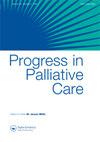The therapeutic potential of psychedelic substances in Hospice and Palliative Care
IF 0.8
Q4 PUBLIC, ENVIRONMENTAL & OCCUPATIONAL HEALTH
引用次数: 4
Abstract
The healthcare field and society at large are witnessing a resurgence of interest in the effects and applications of psychedelic therapies in a wide range of settings. In the 1950s and 1960s, research was conducted to explore different applications for psychedelics, such as lysergic acid diethylamide (LSD) and mescaline, in the healthcare setting. However, psychedelic research was dramatically reduced in the 1970s due to regulatory, political, and social issues. With the resumption of studies involving psychedelics mostly since the 2000s, several studies have been conducted in order to investigate the therapeutic potential of these substances, including in patients with serious diseases. Psychedelics, formerly known as ‘hallucinogens,’ are substances that elicit changes in perception, cognition, emotion and may also evoke peak or mystical experiences. Based on their pharmacological profiles, psychedelics can be classified into four classes: 1) classic psychedelics (serotonin 2A receptor agonists, e.g., LSD, psilocybin, dimethyltryptamine [DMT], mescaline); 2) empathogens or entactogens (mixed serotonin and dopamine reuptake inhibitors and releasers such as methylenedioxymethamphetamine [MDMA]); 3) dissociative anaesthetic agents (glutamate receptors antagonists such as ketamine); and 4) atypical psychedelics (diverse mechanisms of action, e.g., ibogaine, tetrahydrocannabinol [THC], salvinorin A). Most of these compounds are found – or are similar to chemical compounds found – in plants or fungi that have been used for millennia in traditional spiritual or folk healing rituals. Primarily in the fields of hospice and palliative care, assisted psychedelic therapies have been investigated as a potential novel therapeutic modality due to preliminary evidence suggesting their profound impact on psychological, existential, and spiritual outcomes in patients with serious diseases. Results indicate that psychedelic experiences, in a controlled setting, can catalyze psychological processes associated with illness and fear of death, promoting therapeutic effects that impact the physical, mental, and spiritual spheres – thus representing a possible therapeutic tool for providing care to critically ill patients. In a recent interview, Dr. Anthony Bossis, clinical psychologist and clinical assistant professor of psychiatry at New York University School of Medicine, a scientist working in the field of palliative care and psychedelic therapies, states that one of the insights that many psychedelic research volunteers shared is that by turning emotionally toward fear and feelings regarding their death, they often felt less anxiety, more compassion, love for themselves and others, and nurtured new insights. While it can be a challenging experience, by turning to grief, they spoke of experiencing greater acceptance and openness to the mystery of death. In doing so, they reported being able to live more wholeheartedly in the present moment. Taken together, these potential benefits are consistent with the mindfulness, self-kindness and self-compassion that have been identified as important for severely ill patients and palliative care professionals. In addition to patients, studies investigating the therapeutic potential of psychedelics among healthcare providers in crisis settings have also been conducted. Seeking to further assist in improving the condition of healthcare providers active on the forefront during the COVID-19 pandemic, the biotechnology company Cybin and the University of Washington are sponsoring the randomized placebocontrolled trial on psilocybin-assisted psychotherapy for these healthcare providers experiencing COVID19-related issues. The primary goal of the study led by Dr. Anthony Back is to evaluate the effectiveness of psilocybin-assisted psychotherapy in treating symptoms of depression, anxiety, burnout, and post-traumatic stress among these providers. Hospice and palliative care providers are also frequently exposed to existential issues, psychological challenges, and emotional distress associated with end-of-life care. In this regard, future studies could perhaps investigate the therapeutic potential of psychedelics among the hospice and palliative care workforce, since in order迷幻物质在临终关怀和姑息治疗中的治疗潜力
医疗保健领域和整个社会都见证了对迷幻疗法在各种环境中的效果和应用的兴趣的复苏。在20世纪50年代和60年代,进行了研究,以探索致幻剂的不同应用,如麦角酸二乙胺(LSD)和美斯卡灵,在医疗保健环境。然而,由于监管、政治和社会问题,迷幻药的研究在20世纪70年代急剧减少。自2000年代以来,随着涉及致幻剂的研究的恢复,已经进行了几项研究,以调查这些物质的治疗潜力,包括对患有严重疾病的患者的治疗潜力。致幻剂,以前被称为“致幻剂”,是一种引起感知、认知和情感变化的物质,也可能引起高峰或神秘的体验。根据其药理特征,迷幻药可分为四类:1)经典迷幻药(5 -羟色胺2A受体激动剂,如LSD、裸盖菇素、二甲基色胺[DMT]、美斯卡灵);2)致动因子或致动因子(混合血清素和多巴胺再摄取抑制剂和释放剂,如亚甲二氧基甲基苯丙胺[MDMA]);3)解离性麻醉剂(谷氨酸受体拮抗剂,如氯胺酮);4)非典型致幻剂(多种作用机制,如伊博格碱、四氢大麻酚[THC]、salvinorin A)。这些化合物大多是在植物或真菌中发现的,或与发现的化合物相似,几千年来一直用于传统的精神或民间治疗仪式。主要在临终关怀和姑息治疗领域,辅助迷幻疗法作为一种潜在的新型治疗方式被研究,因为初步证据表明它们对严重疾病患者的心理、存在和精神结果有深远的影响。结果表明,在受控环境下,迷幻体验可以催化与疾病和死亡恐惧相关的心理过程,促进影响身体,精神和精神领域的治疗效果-因此代表了为危重患者提供护理的可能治疗工具。在最近的一次采访中,Anthony Bossis博士,纽约大学医学院的临床心理学家和精神病学临床助理教授,一位在缓和治疗和迷幻疗法领域工作的科学家,指出许多迷幻研究志愿者分享的一个见解是,通过将情感转向对死亡的恐惧和感受,他们通常会感到更少的焦虑,更多的同情,对自己和他人的爱,并培养新的见解。虽然这可能是一个具有挑战性的经历,但通过转向悲伤,他们谈到了对死亡之谜的更大的接受和开放。通过这样做,他们报告说能够更全心全意地活在当下。总的来说,这些潜在的好处与正念、自我仁慈和自我同情是一致的,这些对重病患者和姑息治疗专业人员来说是很重要的。除患者外,还开展了研究,调查致幻剂在危机环境中对医疗保健提供者的治疗潜力。为了进一步帮助改善在2019冠状病毒病大流行期间活跃在第一线的医疗保健提供者的状况,生物技术公司Cybin和华盛顿大学正在赞助一项随机安慰剂对照试验,对这些经历COVID-19相关问题的医疗保健提供者进行裸盖菇素辅助心理治疗。Anthony Back博士领导的这项研究的主要目的是评估裸盖菇素辅助心理治疗在治疗这些提供者的抑郁、焦虑、倦怠和创伤后应激症状方面的有效性。临终关怀和姑息治疗提供者也经常面临与临终关怀相关的存在问题、心理挑战和情绪困扰。在这方面,未来的研究可能会调查迷幻药在临终关怀和姑息治疗工作人员中的治疗潜力,因为为了
本文章由计算机程序翻译,如有差异,请以英文原文为准。
求助全文
约1分钟内获得全文
求助全文
来源期刊

PROGRESS IN PALLIATIVE CARE
PUBLIC, ENVIRONMENTAL & OCCUPATIONAL HEALTH-
CiteScore
2.60
自引率
11.80%
发文量
24
期刊介绍:
Progress in Palliative Care is a peer reviewed, multidisciplinary journal with an international perspective. It provides a central point of reference for all members of the palliative care community: medical consultants, nurses, hospital support teams, home care teams, hospice directors and administrators, pain centre staff, social workers, chaplains, counsellors, information staff, paramedical staff and self-help groups. The emphasis of the journal is on the rapid exchange of information amongst those working in palliative care. Progress in Palliative Care embraces all aspects of the management of the problems of end-stage disease.
 求助内容:
求助内容: 应助结果提醒方式:
应助结果提醒方式:


